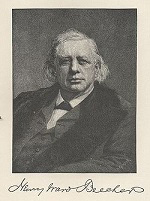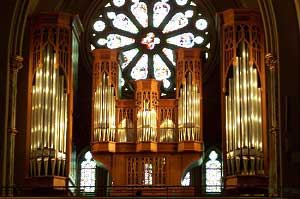

|
| Musical Musings: Miscellaneous |
|
|
The Prelude
What is the use of the opening prelude? Is it amusement — a musical luxury? When people enter the house of God upon the Sabbath, they come from care, from business, from secular pleasures and duties. And the two things needed at the beginning of public worship are, first, a transition from ordinary thought and feeling into a higher and more devout frame of mind; and, second, a unity of feeling, a fellowship in the whole assembly. Now, it is in the power of music to arrest the attention, to change the current of feeling, to draw off the thoughts from common things, and to give to the mind, if not a religious tone, yet a state higher than before, and from which the transition to worship will be easy and natural. Nothing will bring worshippers into a state of feeling common to all sooner than proper organ music. This, then, is the object of the prelude.
Upon entering the house of God, there is, as it were, a screen of sound rolled down between the audience and the outward world.
Every susceptible nature is drawn out from sordid or sad thoughts, the careless are interested, and the attention of all is attracted to a common influence that is molding them gently to holy thoughts and feelings.
This organ prelude admits of as great a range of usefulness as any service of music in the church. And it is a thing to be studied and remedied. If organ playing is but organ diversion in church, if it is only gratifying the taste, the organ had better be silenced. But if organists feel the power of the Sabbath day — if it lists its light upon them as the day that brought salvation to the world, and fills their soul with rejoicings and gratitude — they will be able upon so stately an instrument to pour forth strains that will win the congregation to sympathy with them. Henry Ward Beecher, The Organ, New York Music Review and Gazette 10, no. 12 (June 11, 1859) |
Submit Your Music / Contact Us / Company Description / Links
 Henry Ward Beecher was the first pastor of Plymouth Church, Brooklyn NY, and served from 1847 until his death in 1897.
Plymouth is a Congregational Christian Church, established in Brooklyn Heights by transplanted New Englanders.
Pastor Beecher was an ardent supporter of congregational singing; he and his brother Charles compiled the Plymouth Collection in 1855, the first hymnal to print words and music on the same page.
Beecher wrote considerably on the organ, including this 1859 essay on the Prelude, equally pertinent in today's Catholic parishes.
Henry Ward Beecher was the first pastor of Plymouth Church, Brooklyn NY, and served from 1847 until his death in 1897.
Plymouth is a Congregational Christian Church, established in Brooklyn Heights by transplanted New Englanders.
Pastor Beecher was an ardent supporter of congregational singing; he and his brother Charles compiled the Plymouth Collection in 1855, the first hymnal to print words and music on the same page.
Beecher wrote considerably on the organ, including this 1859 essay on the Prelude, equally pertinent in today's Catholic parishes.
 Of course, this object will determine the fitness of a prelude.
It may be slow and soft; it may be grand and majestic; it may be persuasive and soothing; or it may be jubilant, as celebrating the incoming of Christ’s Day! But the end to be gained is in the hearts of the audience, not in the ears of connoisseurs.
That is good which gains the congregation to a preparation for worship, and only that is good.
No organist who knows the almost omnipotent power of association will greet the congregation with marches or opera airs, which take the thoughts right back to the world.
No organist either, who has religious sensibility, will take such a time laboriously to perform intricate pieces that are, perhaps, masterpieces of skill, but which are about as fit for the church as Paradise Lost would be for a hymn.
Of course, this object will determine the fitness of a prelude.
It may be slow and soft; it may be grand and majestic; it may be persuasive and soothing; or it may be jubilant, as celebrating the incoming of Christ’s Day! But the end to be gained is in the hearts of the audience, not in the ears of connoisseurs.
That is good which gains the congregation to a preparation for worship, and only that is good.
No organist who knows the almost omnipotent power of association will greet the congregation with marches or opera airs, which take the thoughts right back to the world.
No organist either, who has religious sensibility, will take such a time laboriously to perform intricate pieces that are, perhaps, masterpieces of skill, but which are about as fit for the church as Paradise Lost would be for a hymn.